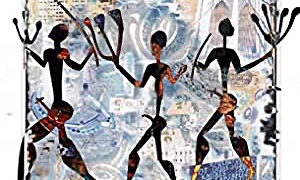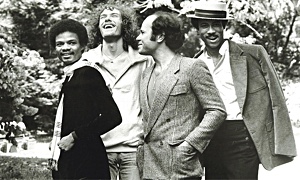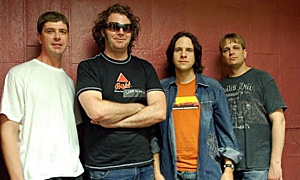Home » Jazz Articles » BackTracks » Your Eggs Scrambled, Any Way You Like
Your Eggs Scrambled, Any Way You Like
 Bluth
Bluth Bluth
Self Produced
1997
If Frank Zappa were around to make his famous posit "Does humor belong in music?" directly to Tim Lefebvre, Zach Danziger and Pete Davenport, it's easy to imagine their answer would be something like, "Are you kidding? Everything belongs in music!" While the encounter may be purely fictional, the answer is completely verifiable, in the form of their 1997 album Bluth. A stylistic confluence of just about everything imaginable— jazz, rock, drum and bass, musique concrete, faux-rap, cut-and-paste editing, stream-of-consciousness comedic anarchy, etc.— Bluth, at first, seems some sort of demented prototype for aural entertainment going into the jaded age of ever-shortening attention spans and nothing-is-shocking mentalities. And it certainly is all that, but thankfully, it's also much more. With a stunning roster of guest players and great performances interspersed throughout the chaos, Bluth is actually a kind of testament to when the organizational, musical and creative imaginations come together in equal measure with a social delinquency that borders on depravity. In other words, Bluth is highly explosive, insanely brilliant and thoroughly entertaining.
 Scott Johnson
Scott Johnson Mind Out Of Matter
Tzadik
2018
Even going all the way back to his first recording— John Somebody (Nonesuch, 1986)— it was terribly evident that Scott Johnson was more than a experimental guitarist/composer armed with a razor blade and penchant for splicing tape fragments into compelling bits of musical curio. And if JS sounds at all dated today, it's because Johnson was force-birthing his musical vision into a world that still lacked the technology to adequately midwife it.
As technology has been catching up to Johnson in the ensuing decades, it's enabled him to more fully (and seamlessly) manifest that musical vision upon those who would listen and 2018's Mind Out Of Matter is in many ways the full culmination of Johnson's vast, enigmatic musical talents. Like his previous outings, MOOM incorporates his signature uses of the correspondent musical tones in speech (and speech loops) for melodic and rhythmic development with his decidedly non-classical worldviews in an "orchestral" setting, but it does it in perhaps the most brilliant ways yet.
With the Alarm Will Sound ensemble as his performance vehicle—which uses both classical and non-classical instrumentation—Johnson pushes an already capable and talented group of players to new heights, both structurally and stylistically. But the full coup of Mind Out Of Matter lies in Johnson adding the lectures of philosopher Daniel C. Dennett as the speech-based material from which he draws his compositional inspiration. Where in the past Johnson's spoken "fodder" may have included voices on answering machines or randomly recorded people in the street (albeit in poignant ways), here he uses spoken content in a way that maintains the thought-provoking nature of the intellectual concepts therein. This makes for a much headier brew.
With Dennett's potent ideas disemboweled into swirling, free-associating musical orchestrations, Mind Out Of Matter can be as stunning and immersive as it is a bit of a mind f**k. It also certainly may not be everyone's idea of a good time but it is surely the best exemplar of what Johnson has become: a modern exploratory composer of the first order. Dare yourself to investigate it.
 Don Li
Don Li Gen
Tonus Music Records
1997
Perhaps not such an egg-scrambler today, but back in1999 it certainly was. Sure it drew on some minimalist ideas expounded by others—Steve Reich, Phillip Glass, Terry Riley and the like—but with Gen, those ideas gelled in a way powerful enough to launch (or at least reactivate in quasi-jazz mode) a modern musical movement. Ironically, Li would shortly distance himself from the very movement he inspired and his fellow conspirator Nik Bärtsch would emerge as the de facto godfather of the Swiss minimalists with his band Ronin. Time and familiarity with Ronin and other like-minded bands may have indeed softened the revolutionary nature of Li's conceptual shift to today's ears but for being the Big Bang of Swiss Minimalism, Gen still sounds exciting—and anything but primordial.
 Seamus Blake
Seamus Blake Superconductor
5 Passion
2015
Chances are, if you picked up saxophonist Seamus Blake's Superconductor with any preconceived stylistic notions at all, you went, "Huh?" That's because its songs seemingly come from three very different places. There's a group of tunes outfitted for forays into Weather Report-ish territory. Then there are more orchestrally-lineaged pieces performed with strings. Finally there are hybridized, vocal-oriented songs sung by Blake himself. This makes it highly tempting for some to use a word out of the reviewer's handbook and describe Superconductor as "uneven," when the more accurate sentiment might be that it's a touch schizophrenic. As such, it would be a shame to distance oneself from the album on that basis alone because in the end, problems with its multiple personalities are more a listener's disorder than an artist's. Also because it includes some great participants (such as John Scofield, Matt Garrison, Scott Kinsey and Nate Smith) as well as some exuberant performances. It should be a no-brainer for eclecticist Blake fans but certainly something of a delightful conniption starter for those keen on arranging their music collections by genre.
 Project Z
Project Z Lincoln Memorial
Abstract Logix
2005
The whole "composition versus improvisation" thing will probably always be a thing for jazz. And while critics and listeners debate over what is the perfect spot between the two musical poles, most artists seek their own equilibrium, just like they might seek their proper personal balance point between cerebral/conceptual artistry and "Can your mama recognize you on the radio?" But there are those who run for the extreme boundaries of the great debate, in this case, Project Z going full tilt down the improvisational sideline with it's 2005 release Lincoln Memorial.
Just as it's rare that a fully-composed album can impart the ineffable lift found in improvised music, fully—(or in this case nearly fully)— improvised albums that leave their mark on the memory can be equally rare birds. But on Lincoln Memorial, the Z's create that particular paradox—an album that has no memorable tunes or natural subdivisions at all, yet exhibits a performance and synergy so powerful, the experience of listening to it strikes one as indelible.
The core band is comprised primarily of musicians groomed by iconic musical lightning rod Col. Bruce Hampton (most notably Jimmy Herring, Jeff Sipe and Ricky Keller). Because of this—and despite M-Base-pedigreed saxophonist Greg Osby being a glaring accomplice to proceedings— Lincoln Memorial has been known to acquire the (sometimes pejorative) labeling of "jamband record." At best this is inaccurate for as electric as it is, it's philosophical mantra is pure jazz. At worst, this misnomer elicits an accompanying reflexive snub from certain jazz quarters. It's definitely their loss as there are very few albums that entertain on such a high level of sustained, pure improvisation—jazz or not. In the end, it doesn't matter whether the purveyors of the music were weaned on Coltrane, The Allman Brothers, Ornette Coleman or the Colonel himself—(in this case it sounds like it might be all of the above)—because the music is thoroughly amazing.
Tracks and Personnel
BluthTracks: ...So I Said; From The Flight Deck; Very Good; What's Your Time Frame?; Sox Are On; You Dig; Drumfommercial; The Boom Tune; Sikadis; A Walk In The Woods; Vegetarian Takeout; Pesticide Panties And A Portrait Of Marge; The Over The Ear Look; Otto; Blaj Collaj; Closing Remarks.
Personnel: Pete Davenport: drums, lead vocals, percussion; Zach Danziger: drums, programming, background vocals, trumpet(2), awshit; Tim LeFebvre: bass, programming, lead, background and Prescott C. Farnum vocals, rhythm guitar, keyboards, tenor saxophone(2); Dave Jensen: tenor saxophone; Andy Middleton: soprano saxophone; Steve LeFebvre: trumpet; Ruben Guitierrez: clarinet; Wayne Krantz: guitar (3); Marcus Wolf: wah-wah guitar, voice; Sylvester Lightpocket: drum groove at fade (3); Lincoln Goines: voice; Anton Fig: drums (6); Steve Tavaglione: alto and tenor saxophone (7); Mitch Forman: keyboard solo (7); Brian Delaney, Manfred Brundi: background vocals; Dan Zank: keyboards; Peter McCann: guitar; Rufus Philpot: BBC news report; Ali Dee: rap vocal; Leni Stern: guitar; Denise Davenport: voice; Bruce Saunders: guitar; Julio Pena: vocals; Will Lee, Dennis Chambers, Lionel Cordew, Chuck Loeb, Jon Werking, Matthew "Stilts" LeFebvre, Murray Siegelbluth, Baird Stiles, Sid Baum, Brandon Danziger, Tony Verderosa, Dale Sumner, Todd Childress, Steve Arnold, Howard Danziger, Paul Socolow: various appearances (14).
Mind Out Of Matter
Tracks: Cow Design; Invisible Agents; Winners; Good For Itself; Stewards; Surrender; Path Up; Awe.
Personnel: Alarm Will Sound: Alan Pierson: conductor; Erin Lesser: flute, piccolo; Christa Robinson: oboe; Chad Smith: clarinet, saxophone; Elisabeth Stimpert: clarinets; Michael Harley: bassoon, voice; David Byrd-Marrow: french horn, voice; Chris Thompson: drums, percussion; Sam Jones: trumpet; Michael Clayville: trombone, voice; Matt Smallcomb: percussion; Luke Rinderknecht: percussion, voice; John Orfe: piano, keyboard; Courtney Orlando: violin, triangle, voice; Caleb Burhans: violin, electric guitar, voice; Nadia Strota: viola, shaker, voice; Stefan Freund: cello, voice; Miles Brown: double bass, electric bass, voice.
Gen
Tracks: Part 39; Part 34; Part 25; Part 36; Part 29; Part 32; Part 43; (additional tracks on 2004 reissue): Part 35 remix; Part 32 remix.
Personnel: Marco Agovino: drums; Bjorn Meyer: bass; Nik Bartsch: piano, Fender Rhodes; Patrik Lernjen: guitar; Werner Hasler: trumpet; Don Li: alto sax.
Superconductor
Tracks: Ohm; Sofa Song; Forecast; Last Continent; Send In The Clones; Kepler-186f; Gracia; Entheogen; I Do.
Personnel: Seamus Blake: EWI, tenor and soprano saxophone, vocals; Judd Miller: EVI; Steve Tavaglione: EWI; Nate Smith: Drums; Matt Garrison: bass; Scott Kinsey: keyboards; Gary Novak: drums; Gonzalo Rubalcaba: piano; Matt Clohesy: bass; Arto Tuncboyaciyan: percussion; John Scofield: guitar; Vickie Yang: conductor; Rachel Fastenow: flute; Douglas Yates: clarinet; John Ellis: bass clarinet; Marshall Gilkes: trombone; Rob Mosher: english horn, clarinet;Tom Ciu: violin; Stephanie Griffin: viola; Felix Fan: cello;
Lincoln Memorial
Tracks: Departure; Miso Soup; Stale Salt Lugs; Freener Frolic; You Do; Sister Barbie; Slaif; Sad Sack; Ol' Bugaboo; Zamb Fear; Microburst; Lincoln Memorial; Arrival.
Personnel: Jimmy Herring: guitar; Rick Keller: bass; Jeff Sipe: drums; Jason Crosby: keyboards; Greg Osby: alto saxophone.
Tags
Backtracks
Mike Jacobs
Self-Produced
Frank Zappa
Tim Lefebvre
Zach Danziger
Tzadik
Alarm Will Sound
Tonus Music Records #1
Steve Reich
Phillip Glass
Terry Riley
Nik Bartsch
Ronin
5 Passion
Seamus Blake
Weather Report
John Scofield
Matt Garrison
Scott Kinsey
Nate Smith
Abstract Logix
Jimmy Herring
Jeff Sipe
Ricky Keller
M-BASE
Greg Osby
PREVIOUS / NEXT
Seamus Blake Concerts
Support All About Jazz
 All About Jazz has been a pillar of jazz since 1995, championing it as an art form and, more importantly, supporting the musicians who make it. Our enduring commitment has made "AAJ" one of the most culturally important websites of its kind, read by hundreds of thousands of fans, musicians and industry figures every month.
All About Jazz has been a pillar of jazz since 1995, championing it as an art form and, more importantly, supporting the musicians who make it. Our enduring commitment has made "AAJ" one of the most culturally important websites of its kind, read by hundreds of thousands of fans, musicians and industry figures every month.

























